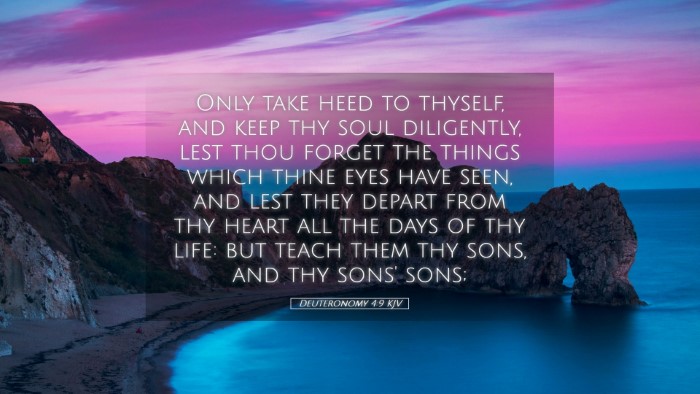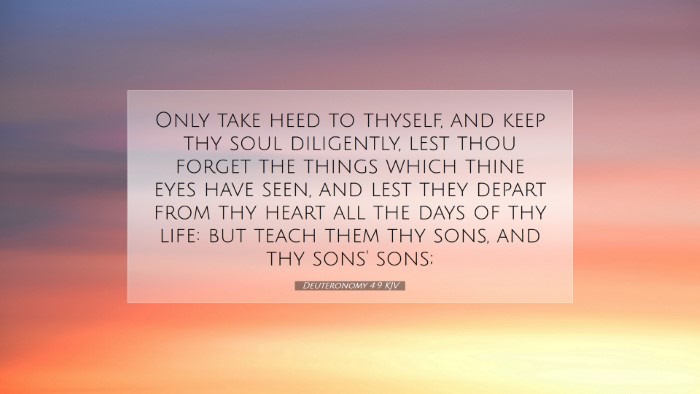Commentary on Deuteronomy 4:9
Verse: "Only take heed to thyself, and keep thy soul diligently, lest thou forget the things which thine eyes have seen, and lest they depart from thy heart all the days of thy life: but teach them thy sons, and thy sons' sons;" (Deuteronomy 4:9, KJV)
Introduction
This verse from Deuteronomy encapsulates a vital exhortation to the people of Israel to maintain a conscious awareness of the Lord's works and teachings. It emphasizes the importance of memory and teaching within the covenant community. Through the insights provided by esteemed biblical commentators like Matthew Henry, Albert Barnes, and Adam Clarke, we gain a richer understanding of its implications for both ancient Israel and modern readers.
Contextual Overview
The Book of Deuteronomy serves as a farewell discourse of Moses before the Israelites enter the Promised Land. Throughout this book, Moses reiterates the law and the covenant between God and Israel, grounding the community’s identity and moral framework in remembrance of God’s mighty acts.
Key Insights from Commentaries
Matthew Henry's Perspective
Matthew Henry points out that the exhortation “take heed to thyself” emphasizes personal responsibility. He articulates that the Hebrew phrase implies a full attention to one’s spiritual state and an active participation in the covenant relationship with God. According to Henry, it is not only the actions but also the heart that must be preserved.
- Memory of God's Acts: Henry stresses the significance of remembering the miraculous things God has done for Israel. Forgetting these events can lead to a loss of faith and devotion.
- Transference of Faith: The command to teach future generations highlights the importance of discipleship within families. He points out that faith is not merely a personal endeavor but a communal and generational responsibility.
Albert Barnes's Commentary
Albert Barnes underscores the imperative for vigilance—highlighting that “keeping thy soul diligently” calls for an intentional approach to faith. He elucidates that it refers to guarding oneself not just against external threats but also against internal complacency.
- Spiritual Vigilance: Barnes insists that there must be a conscious effort to remember God’s covenant and His laws, encouraging believers to engage actively in spiritual practices that foster memory and obedience.
- Intergenerational Teaching: Like Henry, Barnes emphasizes the role of teaching the next generation, indicating that forgetting God’s works can lead to spiritual decline not only for the individual but also for their descendants.
Adam Clarke's Insights
Adam Clarke takes a more detailed view of the verse, examining the phrase “keep thy soul diligently.” He elaborates that this involves a holistic approach, considering one’s mind, body, and spirit. Clarke also points out the historical context of Israel’s experience at Sinai as a foundation for this command.
- Holistic Spirituality: Clarke emphasizes that one must engage all facets of their being in the pursuit of God’s ways, suggesting that spiritual neglect in any area leads to a diminished faith.
- Historical Context: Clarke reminds readers of the powerful experiences at Mount Sinai, aligning the call to memory with tangible historical events that shaped Israel’s identity, thereby serving as a motivation for adherence to God’s statutes.
Modern Application
The message in Deuteronomy 4:9 remains profoundly pertinent for contemporary readers. The commandment to guard one's soul diligently is a call to mindfulness in faith. As pastors and leaders, there is a responsibility to ensure that congregations remain connected to their spiritual heritage and the narratives that shape their identity.
- Personal Accountability: In a world filled with distractions, believers are challenged to focus on their relationship with God and protect their spiritual wellbeing.
- Discipleship and Mentorship: The directive to teach future generations mandates an active engagement in discipleship, encouraging believers to be intentional in sharing their faith stories and God’s works.
- Covenantal Community: This verse reinforces the concept of a community of faith where memories and teachings are preserved collectively, ensuring that the covenant remains vibrant across generations.
Conclusion
Deuteronomy 4:9 is not only a plea for remembrance but also a clarion call to cultivate a robust spiritual life that impacts generations. Through the insights of established commentators, it is evident that the act of remembering God’s works and teaching them to subsequent generations is essential for maintaining spiritual vitality and fidelity to the covenant relationship we share with God.


